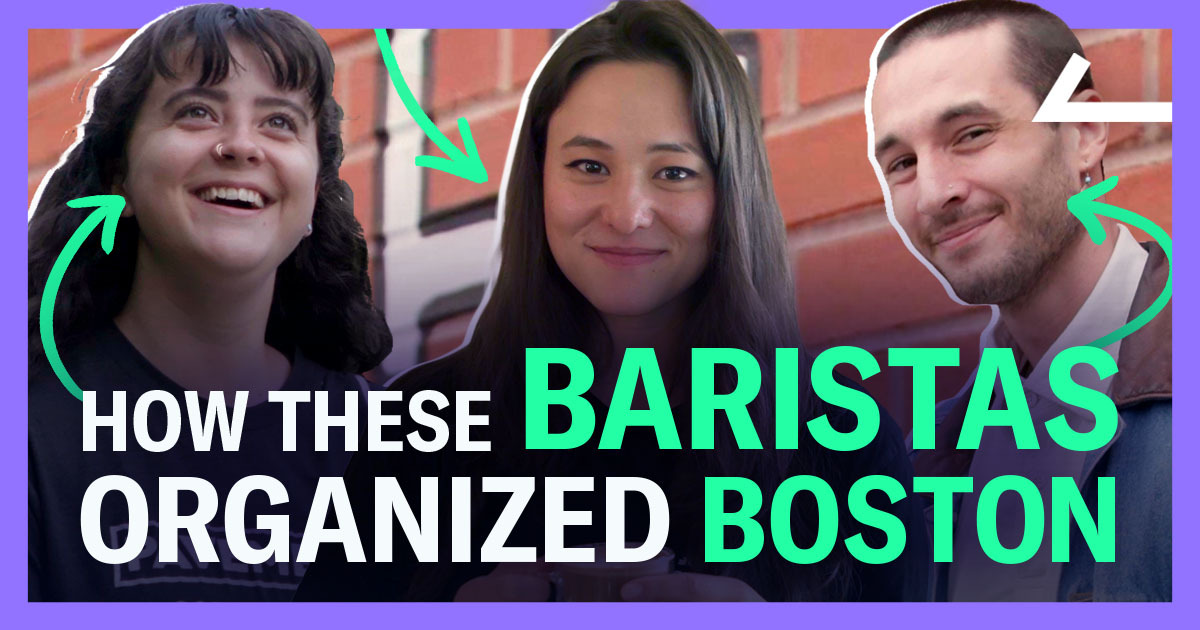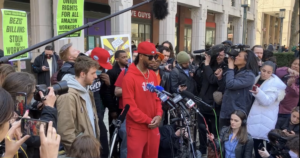Produced and edited by Paula Pecorella, Nicole Barasz, and Nes Sanchez
How did coffee shop workers become the vanguard of the labor movement? We spoke to the workers who organized the first unionized coffeeshop in Massachusetts (and the second, third, and fourth). Below is a full transcript of the video.
Pavement Barista: I bet you’re wondering how we ended up with baristas at the forefront of a national labor movement. Well, I want to tell you a little story about how this all got started, and it starts right here in Boston, Massachusetts. And about a year ago, I found myself in the throes of the Boston winter, feeling overworked and burnt out.
As I was complaining about this to a friend, they said to me, “Why don’t you form a union?” And I thought to myself, “Aren’t unions for coal miners and factory workers? Why would we unionize?” But the more I started talking with organizers about what a union could provide, it was exactly what we needed at Pavement and that everybody should have the opportunity to form a union. So I decided to organize my friends and coworkers at Pavement. It took off like wildfire.
In three weeks, we had over 80% support from workers at all Pavement locations and won voluntary recognition from management. When baristas from other stores started hearing about what we did at Pavement, the movement took off, spreading to other coffee shops around Boston, just up the street at a coffee shop called Darwin’s, baristas were planning a walkout to protest poor management and the toxic work environment that had been created.
Darwin’s worker: Baristas, like many other tipped workers, are part of their store’s aesthetic. Some customers see us as part of the product, and when you’re feminine presenting, you’re sort of pressured to play that up to meet a certain standard and earn the tips that can make up to 40% of your paycheck. We realized we didn’t have any power in this situation, and unionizing was about shifting the balance of power back from management and into the hands of workers.
We didn’t want a workplace where we don’t have a say in the terms and conditions of our employment. And if that would be the case, we would all quit. Everyone at the store was fed up with this, and the pandemic made it even more apparent that we needed to do something about it. When we heard the baristas up the street had just unionized their coffee shop, we started thinking about what acting collectively could do for us, as workers at Darwin’s.
So we decided to organize a sick out, meaning we would all plan to call out sick on the same day. So I called up one of the Pavement organizers for advice, and they said…
Animated Pavement worker: Don’t do that. You’re going to get fired. You should unionize. Then you’ll have more protections.
Animated Darwin’s worker: Uh huh, really? Good point! Hey guys, forget the strike. Let’s unionize!
Pavement worker: Pavement unionizing was fuel on the fire. We had no idea how to build a union from the ground up, but Pavement baristas handed us the tools and we got to building. After organizing coworkers across four Darwin’s locations, we decided to advocate for a strong sexual assault and harassment policy, as well as a livable wage, gender-affirming health care, and consistent schedules. It took us months to do it, but when we finally announced our union, we were voluntarily recognized by Darwin’s within the week.
Forge worker: Us cafe workers at Diesel, Bloc, and Forge had been super understaffed, especially with the added pressure of Grubhub and other takeout orders. It felt totally impossible to bring our concerns to management. That was when we heard about Pavement.
Animated Forge worker: Hey, William, have you seen this?
Forge worker: We ended up sending an Instagram DM to the Pavement United account and started talking with an organizer about everything a union could do for us. At this point, all I knew about unionizing had come from watching More Perfect Union videos and seeing that workers across many different industries were taking action and organizing for many of the same reasons that we wanted to. But it was an uphill battle to organize our fellow coworkers.
We were fighting exhaustion and a pandemic, so our efforts wound up stalling. But then.
Animated Forge worker: Hey, Will. Have you seen this? [Newspaper reads “Darwin’s Wins Union”]
Forge worker: When Darwin’s Coffee unionized, it was the spark that we all needed to tip things over the edge because from there, things really took off like wildfire. What was uncharted territory before, now seemed entirely possible for us to traverse. We felt a sense of empowerment to start talking to our coworkers about our rights and our dignity at our job. It gave us that extra push we needed to talk to the coworkers we hadn’t before and get them on board.
I think we all started to believe that winning was possible, and in December we surfaced with nearly unanimous support, and we were voluntarily recognized as well.
Animated Big Boss: What the?! What are these kids doing? This is an after-school job!
Pavement worker: But hold up. Just because we want a union doesn’t mean any of the things we’re organizing for are guaranteed. First, we have to reach a contract, and even without a union-friendly workplace, that process can take a long time. For Pavement, it took a full year to reach a contract with management. And at shops where management isn’t friendly to the idea of a union, that process can get dragged out indefinitely. And now that coffee unions are becoming the norm in Boston, the public is paying less attention, giving owners more room to be shady and refuse to voluntarily recognize their worker’s union.
That’s what happened at Phinista and 1369, just down the street from Pavement, Darwin’s, and Forge where management refused to voluntarily recognize the union and forced workers into a months-long election process. But despite the opposition, cafe workers at 1369 still voted overwhelmingly to form a union.
Videography by Joseph Foster



